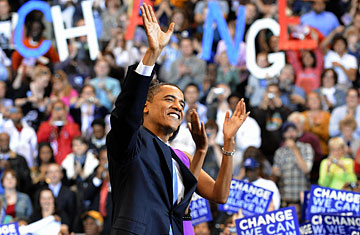
Democratic presidential candidate Senator Barack Obama and his wife Michelle wave to supporters during an election night rally on June 3 in St. Paul, Minnesota
Before he made the speech he'd been inching towards for months, Barack Obama breezed through the front cabin of his campaign plane, chatting with staff and friends who had joined him for the special night. His aides, briefing the press, took care not to gloat about their victory over Hillary Clinton — which was finally made official by a combination of freshly elected delegates in Montana and South Dakota and a flurry of unelected superdelegates who rushed onto his bandwagon. Instead, they called Clinton "formidable," and noted that her efforts made Obama a stronger candidate.
Then, in the kind of unapologetic, in-your-face move for which Obama's campaign has become known, the presumptive nominee deplaned and made his way to the St. Paul Xcel Center, the hockey arena in which Republicans plan to bestow their nomination on John McCain during the party's national convention in early September. Before 17,000 screaming people, Obama paid rhetorical respect to McCain's military past — then pointedly criticized him for allegedly turning away from his reputation as a maverick and becoming a shill for the Bush Administration.
Praising Clinton and attacking McCain. This is what the near term will be about for Barack Obama.
First, Clinton. Obama made little reference to the historic nature of his victory as the first African-American to win a major party nomination on Tuesday night, but he gave a passionate homage to his vanquished rival, noting the barriers she broke as a candidate and her critical advocacy for universal health care. At 11:06 p.m. EST, shortly after he left the rostrum in Minneapolis, Obama left Clinton a message congratulating her on winning South Dakota and asking her to call him back. At 12:16 a.m. she did, and offered to "sit down when it makes sense for you." The two candidates had already had brief contact Sunday, after Clinton's victory in Puerto Rico's primary, and aides expect them to begin more formal talks about how the party will move forward soon, though Obama's communications director Robert Gibbs said, "There are no plans to meet [Wednesday]" as of yet.
The thorniest issue is whether Obama will consider Clinton as a running mate. Even before she's formally suspended her campaign, Obama is under pressure from many Democrats — most prominently Clinton's own supporters — to add the former First Lady to the ticket. While such a move would likely produce a jolt of enthusiasm and unity for a party that has been divided by the contest, it is less clear that the so-called dream ticket would strengthen Obama's chances of beating McCain in November. And some of Obama's advisers looked aghast at Bill Clinton's vituperative public outburst Monday night over a new Vanity Fair story pillorying his post-presidential behavior and associates. The Obama camp remains wary of lashing their fortunes on the campaign trail — and if they succeed, in the White House — to a mercurial, undisciplined, larger-than-life former President; Obama's campaign may be unprecedented enough without that scene.
McCain, in his own Tuesday remarks in Louisiana, assailed Obama's efforts to link him to an unpopular incumbent President and foreshadowed his party's brewing plan to define Obama on its terms, saying "[Obama] tries to drum it into your minds by constantly repeating it rather than debate honestly the very different directions he and I would take the country. But the American people didn't get to know me yesterday, as they are just getting to know Senator Obama."
In St. Paul, Obama declared that the 2008 campaign had changed McCain, who he said "can legitimately tout moments of independence from his party in the past," but has not made "such independence the hallmark of his presidential campaign." In both speeches, the candidates agreed that the voters' hunger for change in Washington and across the country will define the terms of the November election.
But McCain, as he will all summer and fall, argued that Obama is too inexperienced to bring about change — an argument road tested for him by Hillary Clinton. Meanwhile, Obama's critique — that McCain is too much like Bush in his policies and outlook to represent real change — will be repeated to voters over the next few months as well. And it also is the argument that Obama made against Clinton throughout the primary contest.
The primary season provided the overture for these arguments. Now, what may change the most as the race goes from three to two and from intra-party to inter-party is the volume and the ferocity.
